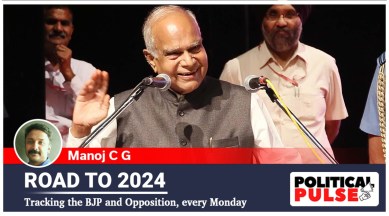SC ruling on Punjab governor: Raj changes, Raj Bhavans not so much
At one point, more than 20 Bills passed by BJP-ruled states were pending with either governors or the President under UPA govt

The Supreme Court’s ruling that a governor cannot sit on key Bills passed by a state legislature, while casting doubts on the validity of a special session held by the Punjab Assembly in which the proposed laws were passed, has reopened the debate on the role of the Raj Bhavan.
And it is an old political flashpoint – both the UPA government earlier and the NDA government now have been accused of using the office of governor to disrupt the administration of Opposition-ruled states.
As Gujarat Chief Minister, Narendra Modi too had constant run-ins with Governor Kamla Beniwal between 2009 and 2014.
In 2010, Beniwal returned a Bill which sought to make voting mandatory in the state. The Bill also had a clause for 50% reservation for women in local body elections. The Modi government had clubbed the Bills together, putting the Congress in a spot as it was in favour of the 50% reservation for women but against compulsory voting.
The stringent Gujarat Control of Terrorism and Organised Crime Bill was another bone of contention.
Another flashpoint was over the appointment of Lokayukta. In 2011, Beniwal returned the Gujarat Lokayukta (Amendment) Bill, which sought to bring office-bearers of local bodies under the ambit of the Lokayukta. A month later, she bypassed the state government and appointed Justice (retd) R A Mehta as Lokayukta, prompting the BJP to approach President Pratibha Patil demanding the Governor’s recall.
In 2013, Beniwal refused to give assent to the Gujarat Lokayukta Aayog Bill passed by the Assembly. This Bill significantly aimed to curtail the power of the governor and Chief Justice of the high court in appointment of the corruption watchdog.
Beniwal was transferred to Mizoram as Governor in July 2014, soon after Modi took over as Prime Minister. A month later, with around 60 days of her tenure left, she was removed.
Now the shoe is on the other foot, with four Opposition-ruled states – Kerala, Tamil Nadu and Punjab now, and Telangana earlier – approaching the Supreme Court against their respective Governors over pending Bills.
While the Kerala government has claimed that Governor Arif Mohammed Khan is yet to give his assent to eight Bills passed by the Assembly, the DMK government in Tamil Nadu has mentioned 12 Bills as pending with Governor R N Ravi.
The Telangana government moved the apex court in April over the Governor’s delay on 10 Bills.
West Bengal Speaker Biman Banerjee has claimed that 22 Bills, some even a decade old, are pending with the Governor, a claim contested by the Raj Bhawan.
Party lines
When in Opposition, both the BJP and Congress have attacked the ruling party for misusing Raj Bhavan powers.
In 2010, a resolution passed by the BJP’s National Executive on ‘Centre’s Assault on the Federal Structure of the Indian Union’, quoting the recommendations of the Sarkaria Commission, said: “The Commission had also made some specific recommendations about the role of Governors and also proposed that active politicians should not be appointed to that post. However, Governors in several states are flouting these norms, obviously at the Centre’s instigation.”
A year later, the party passed another resolution, at its Lucknow National Executive meeting, which said: “… states suffer when their legislatures pass crucial Finance and other Bills which await the Governor’s or the President’s consent months on end.” It then called for a “nationwide discussion in the light of the Sarkaria and Justice Venkatachaliah Commission to revisit the appointment, the role and the functioning of Governors”.
In July this year, into nine years of the Modi-led NDA government, the Opposition’s INDIA bloc said in a joint statement issued in Bengaluru: “We are determined to combat and confront the continuing assault on the Constitution and on constitutional rights of democratically elected state governments. There is a deliberate attempt to weaken the federal structure of our polity. The role of governors and L-Gs in non-BJP ruled states has exceeded all constitutional norms.”
As the Supreme Court gets dragged into it now, will the picture get clearer? Perhaps not anytime soon.